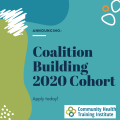Whether you are a fledgling coalition or a well established coalition, this cohort is for you! Each training will focus on different aspects of coalition building and rebranding, and the trainers will be utilizing small group work to allow coalitions at similar stages to work together. Coalitions are also encouraged to apply in groups.
The team at the Training Institute will be reviewing these applications and extending an invitation to 45 applicants. We will select participants for this cohort keeping the following considerations in mind:
- Ability to attend all sessions (requirement)
- Need and readiness for this content area
- Cohort demographics: race/ethnicity, gender, geographic location (within MA), etc.
Applications will be accepted until March 11th, 2020. We will notify those selected for the cohort and those that have been added to the waitlist by February 4, 2020. For questions, please email Kelly Danckert at [email protected].
The Coalition Building Cohort will be facilitated by Gina Rodriguez and Kelly Danckert of the Community Health Training Institute.
Cohort Training 1: Building Successful Coalitions
Date: April 15 from 9:00 am – 1:00 pm at Soule Homestead in Middleborough
Topics: Coalition purpose, vision, governance, and defined structure
In-Person cohort (4 hrs)
Description: Learn the keys to coalition development and sustaining momentum through multiple coalition life-cycles in this training. Participants will come prepared to discuss the essence of their coalition: why it exists, the mission, and how the coalition might evolve over time as members and leaders come and go. What does it mean to adapt as the community changes? Learn about activities, processes, and structures that build and sustain effective coalitions through interactive exercises and worksheets. The trainers will also review a series of case studies of successful coalitions: their bylaws, their mission and vision, and their scope of work to discuss best practices.
Audience: Coalition leaders and members, teams, and partners working towards community health. Coalitions are also encouraged to attend in groups.
 Cohort 2: Overcoming Obstacles: Recruitment, Retention, and Reactivation
Cohort 2: Overcoming Obstacles: Recruitment, Retention, and Reactivation
Date: May 6 from 9:00 am – 1:00 pm at Soule Homestead in Middleborough
Topics: Engaging coalition members that are reflective of the community, how to retain coalition members
In-Person cohort (4 hrs)
Description: If bringing coalition members to the table is difficult, keeping them engaged and at the table is even more difficult. How can we message our coalition to excite people about getting involved? And how do we make sure we are building a coalition filled with members who are reflective of the community? This training will provide a community engagement framework you can use when actively recruiting for new members, along with providing tips for facilitating coalition meetings where everyone is engaged. Participants will leave the training with tangible tools and guides for engaging coalition members across the community engagement spectrum, along with gaining new skills for keeping people engaged and involved over time.
Cohort 3: What Now? Challenging the Status Quo and Embracing Change
Date: May 11 from 9:00 am – 1:00 pm at Soule Homestead in Middleborough
Topics: Coalition lifecycles and sustainability, big picture planning
In-Person cohort (4 hrs)
Description: Sustainability is a key component of any successful project. How does sustainability apply to coalitions? In this training, we will go over the life cycles of coalitions, and how we can plan for any changes that come up in the landscape. We will go over how to challenge the status quo by getting out of whatever box your coalition is confined in. Many coalitions are defined by the work they do (ex. Youth work or substance use prevention) but as we know, many of these issues are interconnected. This training will go over ways to adapt to a changing landscape and break down many of the silos we work within to do coalition work to the best of our abilities. We will also go over the different ways in which we can identify strategic partners, both in our communities and beyond, to remain flexible, adaptive, and ready to embrace change.
